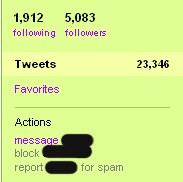Twitter starts to get serious about spammers

Today Twitter announced a new way for its users to alert the service of spammers with a quick link to a "report [user name] for spam" link next to the "message" and "block" links in the right column. This appears to be Twitter's latest attempt at controlling the rampant abuse brought to the site from spammers, and a replacement to it's already existing reporting feature, the @spam account.
In a blog post, the folks at Twitter write:
Click the “Report as spam” button under the Actions section of a profile’s sidebar and our Trust and Safety team will check it out to see what needs to be done. No automated action will be taken as a result of reporting a user as spam (in other words, it can't be used to incite an angry mob against an account you don't like.) And once you report a profile it will automatically be blocked from following or replying to you.
This is a decent attempt from Twitter to help give the users more control in reporting spammers, as it's previous @spam reporting methods were often a one-way conversation. The instructions on the spam account currently read to DM the account for reporting, yet the report is only following roughly 30K of the 100K+ users following it. And while many users would report @spam through public messages, there was no way to know if Twitter was listening.
However, regardless of how good the spam reporting is, Twitter still need to get more serious about what it's doing to stop spammers and bots in the first place. The battle seems to be currently led by the spammers.
This will definitely help those with protected accounts since we didn't have any way to report spam before. Since @spam didn't follow us, it couldn't 'hear' us," said Kevin Riggins, senior information security analyst, Principal Financial Group. "Whether it is any more effective at actually having an impact on spam is an entirely different topic and I think it is going to take more mature automated processes to help with that."
